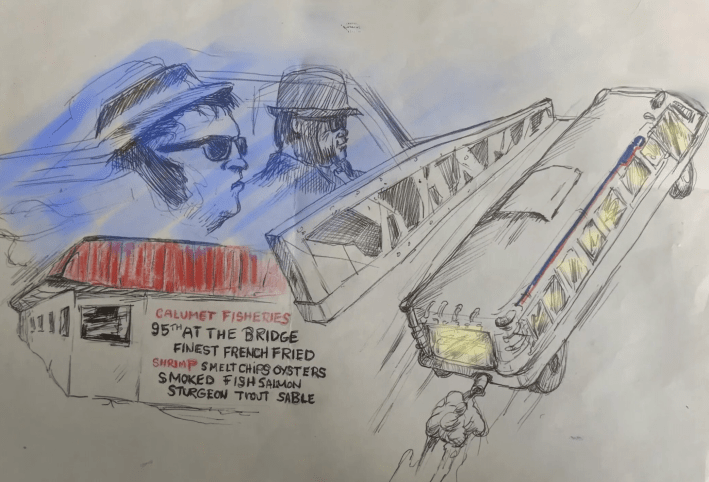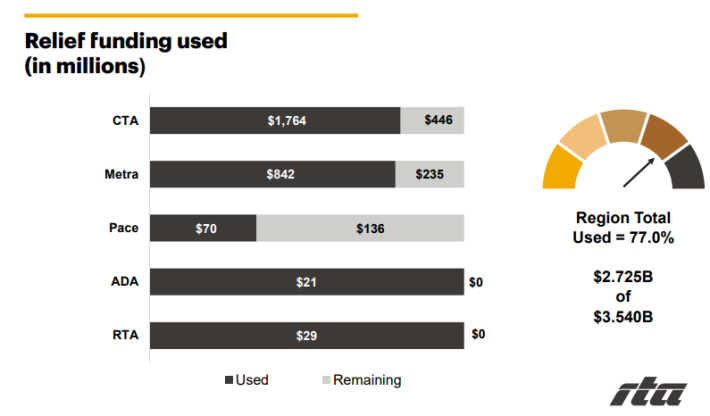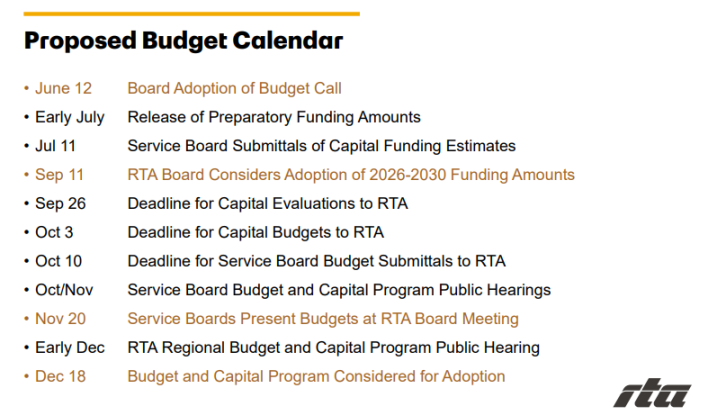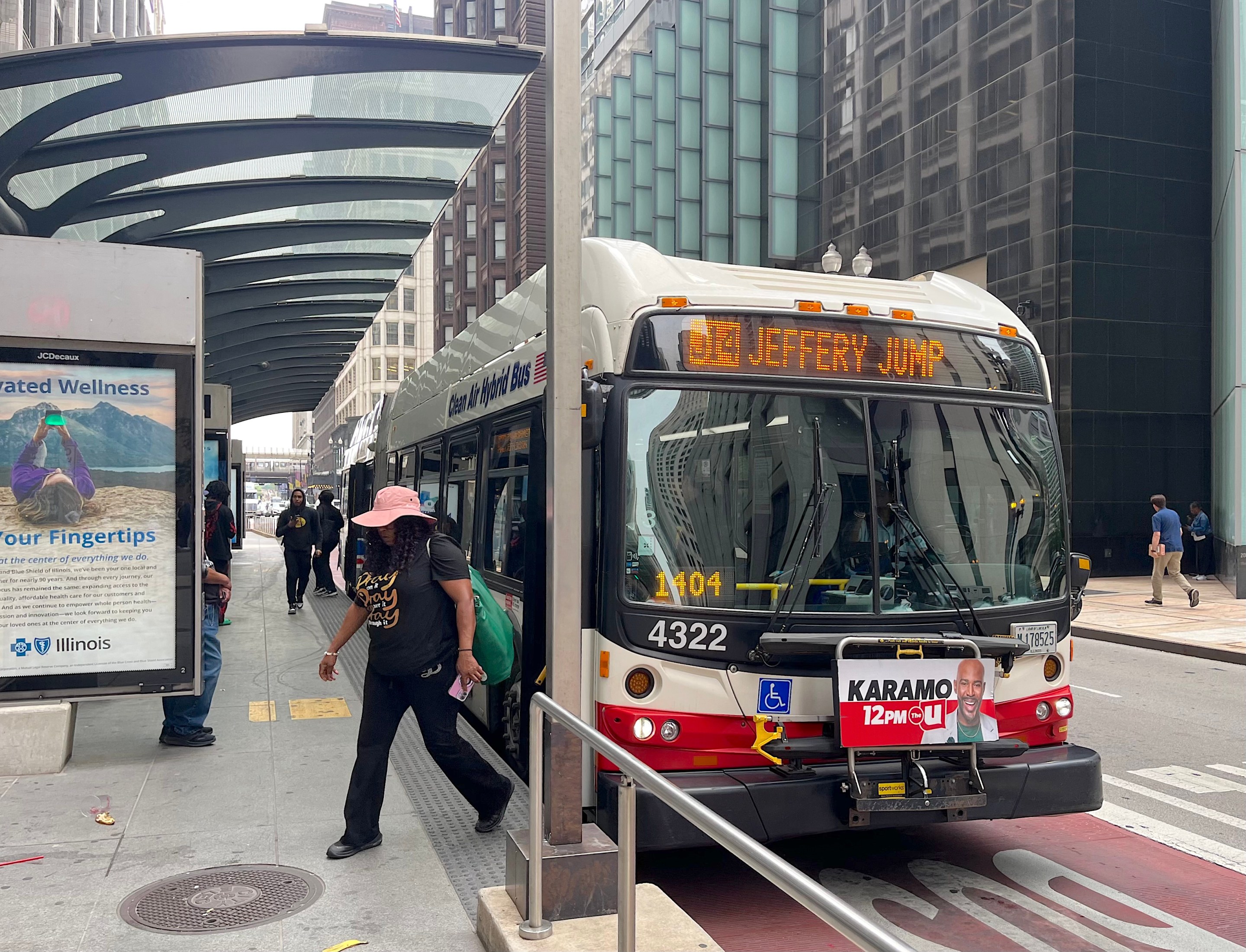
In the wake of #TransitFundingIndecision2025, the Illinois General Assembly's failure to pass a funding and reform bill by the end of the spring legislation session, the possibility of a bailout for Chicagoland transit is far from certain. The CTA, Metra, and Pace need $771 million to fill a projected 2026 budget gap, or else the consequences could be some 40 percent service cut and roughly 3,000 layoffs.
The Regional Transportation Authority, which oversees the three agencies, is asking them to develop two versions of their 2026 budgets. One would address the cash shortfall if the state doesn't come through with more funding. The other could be used if lawmakers at least come through with enough funding to avert the feared transit fiscal cliff.

Today's RTA board meeting was the first one since the Illinois Legislature departed for a holiday in the sun, leaving Chicago-area public transportation high and dry. Today's hearing was to give the service boards general direction on what their budgets should look like. RTA officials said they are hopeful that Springfield will approve funding, whether it’s during a special summer session or the fall veto session. But they also warned that, because it would take months for many of the funding sources to actually bring in revenue, that delays means the RTA needs to figure out a funding stopgap for the first few months of 2026.
RTA Board Chair Kirk Dillard said he is putting together a task force that will meet biweekly to determine how to reduce expenses, develop a systemwide fare increase, and brainstorm how to stretch remaining federal COVID-19 stimulus funding as long as possible.

During RTA Executive Director Leanne Redden's report at the start of the meeting, she said the RTA Act of 1983, which established the bureau as a regional oversight agency, dictates the timeline for the regional transit budget. As such, the CTA, Metra, and Pace have no choice but to start planning for service cuts, fare increases, and layoffs this month.

"As often as we could, we said that May 31 [the end of the spring legislative session] would be the deadline, that, if missed, our work would be put on the path to austerity," Redden said. "We have no other choice but to begin a budget process that assumes that we'll have 20 percent less funding in 2026." She added that the RTA still intends to work with lawmakers to find a funding solution, and try to ensure riders won’t feel the impact of the cuts "until the latest day possible... But the sad truth is, now, at least some of those impacts are unavoidable."

Redden said that, while she was asked when the deadline would be to avert the cuts, "there is no clear answer to that specific question, and more importantly, one clear date." Instead, that would depend on what kind of revenue streams clear the General Assembly.
"I don't want to give everyone false hope that there's a way to avoid some of the negative impacts." Redden said. She added that "This is an outcome that was preventable, but we stand ready to do the work and respond to what's coming down the path."

Dillard, a former state senator, said he is well aware that "there is always a lag" between the new funding getting approved and the funds actually reaching their destination. "You have to have rules, you have to have regulations," he said. "It's not a light switch process. It will take several months to have any new flow of revenue."
Dillard said the RTA agrees with the legislature's "No Funding Without Reform" wing, lead by politicians like Sen. Ram Villivalam (D-Chicago) and Rep. Kam Buckner (D-Chicago), that transit governance changes are needed. However, the board chair argued that the legislators spent too much time focusing on governance reform, and didn’t really tackle new funding until a few days before the end of session. "Governance is important, but it clearly led to the lack of discussion about revenue," he said.

RTA Director of Government Affairs Rob Nash noted at today's meeting that that legislators won’t have much time to avert the fiscal cliff during the veto session. That hearing is scheduled for October 14-16 and October 28-30, so six days total. Nash also noted that the lawmakers want the bill to take effect immediately, it must be approved by a three-fifths supermajority. Otherwise, it won’t kick in until June 2026. He said the supermajority might be a tall order, because "as we saw in the Senate, we barely got a simple majority."
Nash added that the RTA board shouldn’t count on the revenue sources in the Senate legislation that passed last month making their way into the final funding bill, if it does materialize. "We should not operate under assumption that any of that is a given," he said. "We need to sort of restart the conversation now that we have gone into overtime. In fact, we shouldn’t assume anything, to be honest."
Board reaction

RTA board member Nora Cay Ryan, one of the directors who represent the City of Chicago, said she is concerned about the impact the funding uncertainty will have on transit employees. "Imagine the feeling of showing up to work every day for the next six months, not knowing if you're going to have a job [in the future]," she said.
Ryan asked what the impact would be if the funding gets approved during a summer special session versus the fall veto session. Nash replied that, for example, changes to the existing RTA portion of the sales tax would kick in fairly quickly, since that would simply involve adjusting the rate.
On the other hand, "If we establish a new tax, or a novel idea that requires rules and regulations and notification to taxpayers, that could take much longer to implement," he said. But he added that, either way, the transit agencies may not see revenue until as late as July 2026. "We are likely to face the challenge in first part of 2026 no matter what the General Assembly does at this point," he said.

Board member Tom Kotarac, another Chicago representative, said that he chose to interpret the bill passing even one chamber in the state capitol as a positive sign, because the legislators "took tough votes." "It wasn't easy," he noted. "We're half-way there."
If cuts are necessary cuts, Kotarac urged the transit agencies to coordinate service with each other. "We can't have one bus leading to a train that's not there," he said.
Kotarac also addressed one of the criticisms levied at the Senate bill: claims that it was a bailout for the Chicago area that downstate lawmakers had no reason to invest in. For starters, the legislation that passed the Senate would also fund downstate transit. And Chicagoland makes up about three quarters of Illinois' population and economic output, so as our region goes, so goes the entire Land of Lincoln. Moreover, Kotorac noted that the transit agencies contract with companies from all over the state.

RTA Chief Financial Officer Kevin Bueso warned of another issue. During the pandemic, the General Assembly paused the requirement that the CTA, Metra, and Pace get at least half of their revenue through fares and other revenue sources like advertising, aka the Farebox Recovery Ratio. That holiday will end this year. The problem is, if the transit systems are unable to generate the same amount of money that the state supplied, then whatever the farebox shortfall is, the agencies must refund an equal amount of cash to the state.
All of this is sobering. Here's hoping the impacts Redden warned about, due to the Generally Assembly being a day late and $771 million dollars short at passing legislation, don't wind up being too painful for CTA workers and straphangers.
Watch the video of today's RTA board meeting here:
Check out slides from today's RTA board meeting here.

Did you appreciate this post? Streetsblog Chicago is currently fundraising to help cover our 2025-26 budget. If you appreciate our reporting and advocacy on local sustainable transportation issues, please consider making a tax-deductible donation here. Thank you!






